“The only [Ateneo] bonfire I’ve attended was in 2008.”
It’s a surprise coming from one of Ateneo basketball’s biggest stars. The confession’s irony hangs in the air for a moment, but it becomes perfectly understandable. It’s 3:00 PM; Chris Tiu calls a chicken pesto sandwich and iced coffee his lunch. He had just finished a shoot and has another interview slotted in the next hour.
Yet he doesn’t wolf his meal down; he makes deliberate cuts, chews and enjoys his food with a healthy dose of small talk. “I hope you don’t mind,” he smiles.
It’s been three years since Chris Tiu was in the Ateneo spotlight, when he led the Blue Eagles to the first crown of their current four-year championship reign in the UAAP. To his surprise (and probably no one else’s) he’s been caught up with one success after the other. “I was always groomed and trained to think that I should study hard,” he reflects, “and when I graduate, I’d help out in the family business. Right now I’m doing everything but that.”
For flag and country
Perhaps the most surprising thing he’s done since graduation was to play for the Smart-Gilas Pilipinas Team. He recalls how it was a dicey decision at the time—not only do most college players go for the Philippine Basketball Association (PBA) league, but a three-year, full-time commitment was then unheard of for the national team.
In the end, he says the chance to represent the country was too big to pass up. “Whether or not the program would [be successful],” he says, “It was the biggest honor for me as someone who is passionate about basketball.”
Any glamor that notion held was quickly dispelled. On the road, Gilas played in loosely packed stadiums for unbelieving countrymen back home. “People used to ask me, ‘What are you doing?’” says Tiu. “[They dismissed us as] a bunch of amateurs competing against China and Iran.”
Gilas came just a couple wins shy of an Olympic berth in the recent 2011 FIBA Asia Championship. Once again, Filipinos’ faith and respect for the national team—forever in flux between heart-swelling and head-shaking—surges high. Tiu shrugs off the fickleness of sports fans, knowing that fame flows and ebbs. The only constant, he says, is that no one wants to cheer for a losing team.
The bigger picture
A barista sheepishly interrupts our conversation, brandishing a tray of drink samples. “Okay na ako,” Tiu says, instead turning the barista’s attention to us. “Sila na lang.”
It’s small acts like this—and when you feel like he’s actually interested in small talk—that show Tiu’s authenticity. He’s been criticized for being “boring” and “too nice,” but Tiu has his own brand of character, one rooted in looking at the bigger picture.
Dr. Joseph Ng, a Xavier School student prefect, has known Tiu since his high school days. “I didn’t expect him to pursue basketball or become a personality, but I knew that his character would not change,” he says.
Unlike many celebrities who see endorsements simply as a chance to cash in on their fame, Tiu remains mindful of the images he presents. “A lot of my supporters and fans are younger Filipinos,” he says, “so I make sure that I’m always setting a good example.” It’s this consciousness of influence that sets him apart from the average athlete, businessman and TV personality.
Jack of all trades
A self-described efficiency freak, Tiu says time for himself is hard to come by. “There’s never really a free day,” he says, admitting wasted time makes him uneasy. “Parang hindi ako mapakali.”
As an entrepreneur, Tiu is perhaps best remembered by Ateneans for Chinky Chicken, the JGSOM Student Enterprise Center (JSEC) stall he put up with his friends. “When JSEC just opened, only [one stall] made a lot of money,” he says. It was nothing special, according to Tiu, who knew they could do better with their own business. In no time, Chinky Chicken became a favorite for Ateneo and Miriam College students.
Tiu and his partners expanded their market beyond cafeterias by taking inspiration from a different culture. In particular, traveling to Vancouver and China exposed Tiu to the popularity of milk tea abroad.
“We wanted to differentiate ourselves with our products,” he says of Happy Lemon, the Hong Kong drink franchise he and his partners brought to the Philippines in 2010. “We also wanted it to be a destination, a place where people want to be seen.” He hopes that in the Philippines, as in other Asian communities, drinking milk tea becomes as natural as your morning coffee. He personally recommends the Lemon Yakult Mousse Spin, his current late-night favorite.
Though he also hosts television shows like the entrepreneur-themed Hanep Buhay, Tiu says he was reluctant to try it back in 2007. His broadcast partner for the now-defunct Pinoy Records, however, sealed the deal. “When they said my co-host would be Manny Pacquiao,” he laughs, “I said, ‘Okay, go!’”
Feet on the ground
With all his talent and good fortune, one wonders if there’s anything Chris Tiu can’t do. He pauses to think, and it’s quite telling that he can’t immediately give an answer. “I’m not really an artsy person!” he finally says with a laugh. “I like playing the piano, but I’m a terrible artist.” Tiu also admits his grace on the hard court doesn’t carry over to the dance floor. “I like to dance in the clubs,” he says, “but I’m not really a dancer.”
He also hesitates before naming a favorite book. The ones he likes range from Warren Buffett’s investing philosophies to the compiled homilies of Xavier School president Fr. Johnny Go, which he regards as “practical and thematic.”
Tiu is an exception to the celebrity stereotype; there’s candidness bordering on self-deprecation with the way he talks about what the public might not usually know about him.
For example, Tiu considers himself an old soul. He’s a romantic at heart whose go-to karaoke songs are by Apo Hiking Society. Another favorite is Taiwanese singer Jay Chou, while local singer Sarah Geronimo (“I’ve always admired her talent,” he says) is someone he’d love to work with in the future.
Despite the allure of showbiz, Tiu remains humble and grounded, loyal to his longtime girlfriend and his friends from years back. “I think I’m the same person publicly and personally,” he shares. “What you see is what you get.”
As we wrap up our chat, Tiu agrees to pose for a few photos. We feel a bit guilty knowing he’s already late for his interview with Arnold Clavio. Tiu probably knows it, too, but obliges us anyway. Afterwards we see him off, feeling less like we finished an interview and more like we made a friend.
With reports from Ken C. Coseto
- Photo by Kat A. Mallillin
- Photo by Kat A. Mallillin
- Photo by Kat A. Mallillin
- Photo by Kat A. Mallillin
- Photo by Kat A. Mallillin
- Photo by Kat A. Mallillin
- Photo by Kat A. Mallillin
- Photo by Kat A. Mallilin
- Photo by Kat A. Mallilin

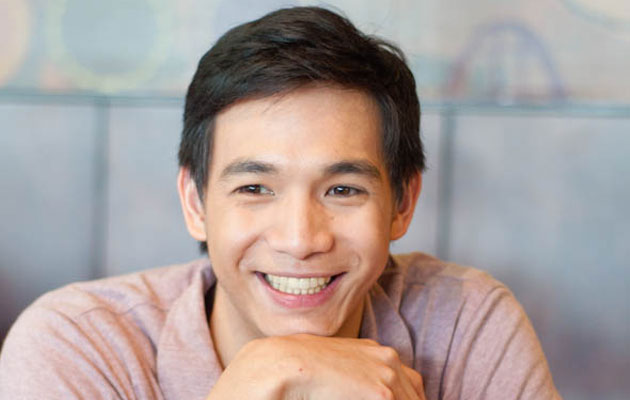

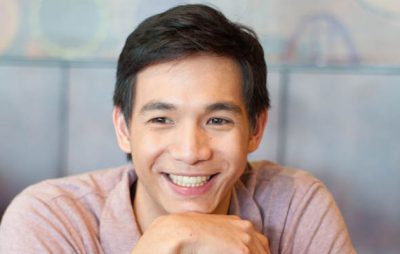
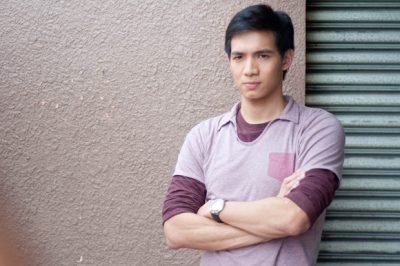



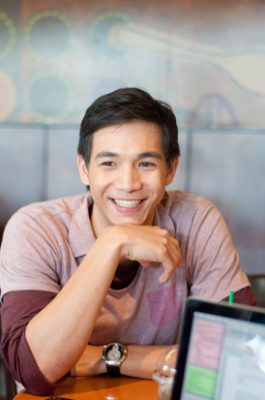
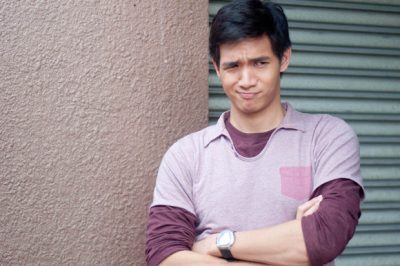








[…] posted by The GUIDON Categories : Featured | Tags : campus journalism, campus paper, confession, […]
[…] This article bears strong resemblance to the story “Chris Tiu: Conversations and Confessions” published online December 3, 2011, written by Job B. de Leon and Alex P. Santiago, the undersigned, and published in the November 2011 print issue of The GUIDON, the official student newspaper of the Ateneo de Manila University (link here). […]